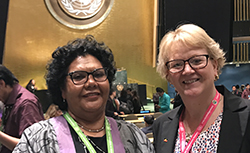Two Charles Sturt University (CSU) researchers are collaborating with an international research group and Indigenous leaders to investigate how Indigenous leaders draw on their inner cultural resources to better their and other communities worldwide.
 "Indigenous leaders draw on their cultural identity in their work
as skilled advocates for the rights of their people," said Associate Professor in
Leadership Michelle Evans in the CSU School of
Management and Marketing.
"Indigenous leaders draw on their cultural identity in their work
as skilled advocates for the rights of their people," said Associate Professor in
Leadership Michelle Evans in the CSU School of
Management and Marketing.
"Indigenous identity is often shaped first and fore most by a history of oppression and marginalization. This perception of Indigenous leadership misses the powerful resources cultural identity brings to Indigenous leaders and their work."
The research project examines how Indigenous social change leaders draw on their cultural identity for leadership, one that helps them to advocate for the rights of their communities.
"We want to discover what it means for Indigenous leaders to develop policy where there is a contest for power and voice," Professor Evans said.
"In addition, we want to know how Indigenous advocates and their people use their cultural identity to generate powerful leadership and advance change."
Four researchers and their assistants in leadership studies, sociology, and political science will identify and work with selected Indigenous leaders from around the world over the next three years, before, during and after these leaders participate in the UN Permanent Forum on Indigenous Issues, based in New York, USA.
 PhD candidate and CSU Centre for Law and Justice lecturer Ms Annette
Gainsford recently attended the latest meeting of the forum to 'shadow' two
Australian Indigenous executive members of the Global Indigenous Youth Caucus.
PhD candidate and CSU Centre for Law and Justice lecturer Ms Annette
Gainsford recently attended the latest meeting of the forum to 'shadow' two
Australian Indigenous executive members of the Global Indigenous Youth Caucus.
"Our initial research suggests that to gain human rights locally, Indigenous leaders used the UN forum to look at their local struggles from different perspectives, sharing experiences and building alliances that reshaped their local campaigns," Ms Gainsford said.
"Ironically, leaders also stated that their local campaign wins often relied upon new strategy ideas from Indigenous leaders facing similar challenges in other regions.
"In addition, the UN forum is ideal for research as leaders draw on and perform their identity in a real life situation. They discuss real claims for local Indigenous rights and social agendas, and transform local struggles into global language that is recognised by intergovernmental agencies."
The research will impact individual Indigenous leaders and their local people by documenting their work, allowing critical reflections to develop model practices in new networks. The researchers will also work alongside them to further build collective capacity for action to support change in their communities.
The research will offer new insights into how Indigenous leadership can be mobilized to effectively develop voice and political participation true to Indigenous cultures, while strengthening the public presence of these leaders.





Social
Explore the world of social